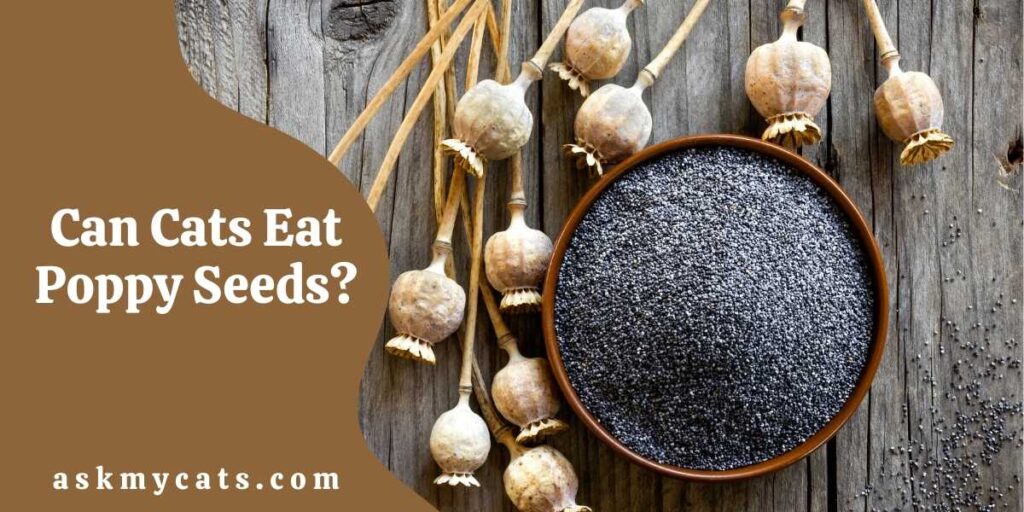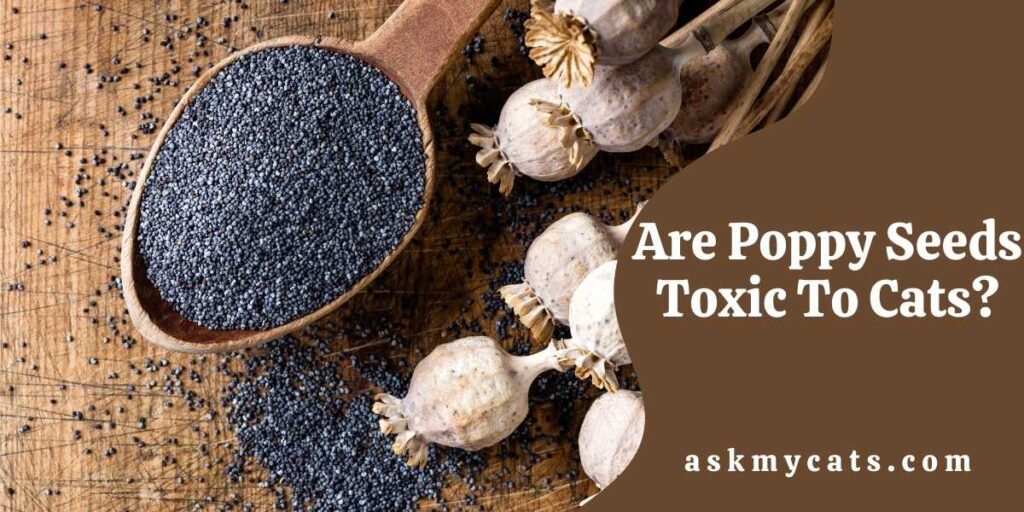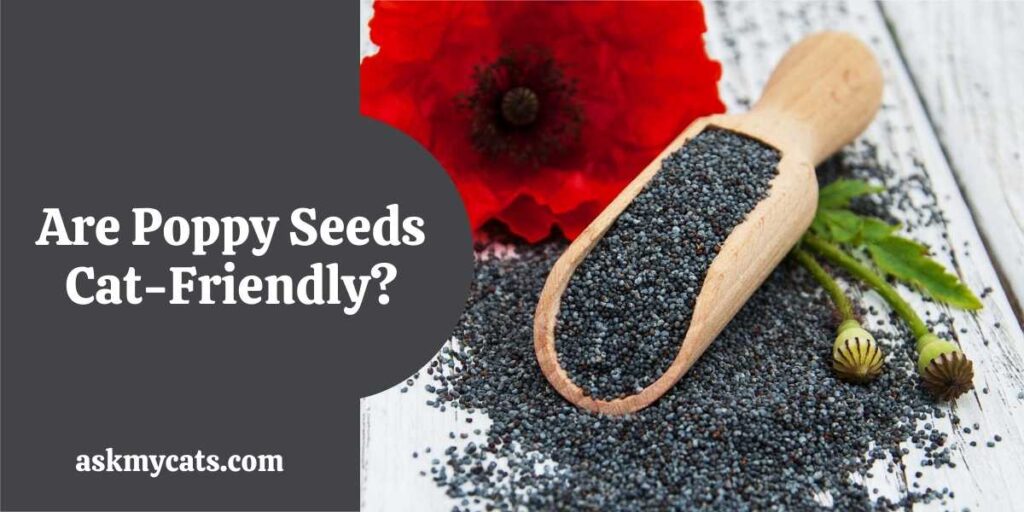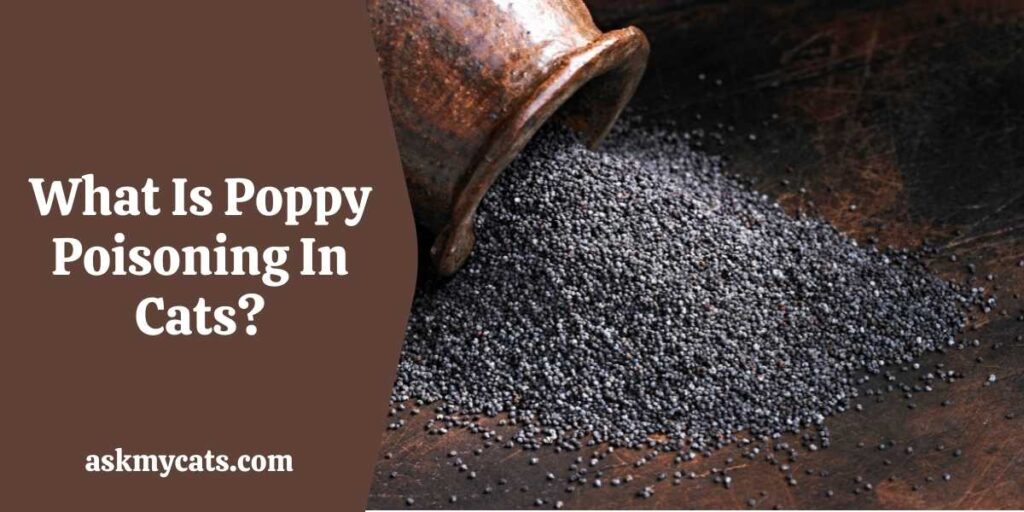Cat owners all around the world are always looking for innovative ways to add variety to their cats’ meals. Including healthy items in your cat’s diet is an excellent way to help them live longer and healthier lives.
However, it’s critical to be aware of foods that may be toxic to cats but are not harmful to humans.
So, can cats eat poppy seeds?
No, cats cannot eat poppy seeds, as they are toxic to them. Each cat is unique, thus their sensitivities to poppy seeds may vary. After eating poppies, some cats become euphoric, while others become drowsy, sleepy, and dizzy. The central nervous system of your cat is attacked and affected by the poppy seeds.
By reading this article you will get a clear view of why you should never feed your cat poppy seeds.


Give Your Cat the Perfect Day
Get the Free Ebook!
What Are Poppy Seeds?
Poppy seed is an oilseed obtained from the opium poppy (Papaver somniferum).
Various cultures have gathered tiny kidney-shaped seeds from dried seed pods for thousands of years.
Many countries, particularly in Central Europe and South Asia, where it is legally produced and sold in stores, continue to utilize it.
The seeds are used whole or ground into meals in many meals, including pastry and bread, and they are pressed to produce poppyseed oil.
Many civilizations’ ancient medical texts reference the poppy seed. Poppy seed is listed as a sedative in the Egyptian papyrus scroll Ebers Papyrus, written around 1550 BC.
The Minoans, a Bronze Age civilization that evolved on the island of Crete between 2700 and 1450 BC, farmed poppies for their seed and employed milk, opium, and honey concoction to calm wailing babies.
Another culture that is known to have grown poppy seeds is the Sumerians.
Poppy seeds are small, kidney-shaped, and have a pitted surface. They are less than a millimeter long and have a pitted surface.
A gram of poppy seeds has roughly 3,300 seeds, and a pound contains between 1 and 2 million seeds. 2-Pentylfuran is the main flavoring ingredient.
Other poppy varieties’ seeds are not eaten, but they are grown for the blooms they produce.
Poppies, both annual and biennial, are wonderful choices for growing from seed since they are easy to reproduce and may be planted immediately in the ground in January.
The California poppy (Eschscholzia California) is an eye-catching orange wildflower that blooms throughout the Western and Northwestern United States, for example.
Are Poppy Seeds Toxic To Cats?
Yes, poppy seeds are toxic to cats.

Many people are curious if cats can consume poppy seeds.
Although it has been stated that cats can safely consume modest amounts of poppy seeds, this is not the case.
Poppy seeds, unlike other seeds that can be consumed in tiny amounts by cats, such as sunflower seeds and sesame seeds, are deadly.
Because each cat is different, their sensitivities to poppy seeds may differ. Some cats will feel minor exhilaration after consuming the substance, while others will become extremely tired, lethargic, dizzy, and even die.
Poppies, unlike other seeds that cats can consume in tiny amounts, such as sunflower and sesame seeds, are hazardous to cats.
Each cat is unique, thus their sensitivities to poppy seeds may vary. After eating poppies, some cats become euphoric, while others become drowsy, sleepy, and dizzy.
Because the poppy attacks and affects your cat’s central nervous system (i.e. his brain), this is the case.
Regardless of the reaction, the poppy poses a mild toxicity risk to cats, and greater quantities can be extremely deadly.
As a result, you should never feed your cat any food that contains poppy seeds of your own volition.
Keep foods containing poppy seeds out of reach of your cat when you’re not around to prevent him from eating them.
If your cat has eaten poppy seeds, it’s critical to keep an eye on him and take the problem seriously right away. You should also speak with a veterinarian as soon as possible to discuss the matter.
If your cat has eaten poppy seeds, even if it was just a bite or two of a poppyseed muffin, you should contact your cat’s veterinarian or call the pet poison helpline right away for a professional opinion.
It’s possible that you’ll be told to take your cat to an emergency veterinarian clinic immediately away.
Check out more details about can cats eat sesame seeds
Are Poppy Seeds Cat-Friendly?
No, poppy seeds are not cat-friendly and should not be fed to cats.

Poppies are poisonous to cats, so do not let them eat the plants or seeds.
The difficult part is that the alkaloids found in poppies differ depending on the species of flower.
Some species contain alkaloids that have an impact on your cat’s central nervous system and brain.
When your cat consumes any part of the plant, he or she may become sedated or excited.
Do not feed poppy seed heads to your cat. These are extremely poisonous. This is the part of the plant that contains all of the seeds in one location.
This could result in a high toxicity dose. If you suspect your cat ate poppy seed heads, please contact your veterinarian.
According to studies, each gram of edible poppy seeds contains between 0.5 and 10 micrograms of morphine.
Fortunately for humans, you’d have to eat a lot to get any kind of drug high or narcotic effects. However, any amount can be toxic and harmful to cats.
“The alkaloids found in poppies differ with each species; some can affect the central nervous system,” experts say (e.g., brain).
Any part of the plant can cause sedation or an excited (e.g., euphoric) state if consumed.” This is what causes the poisoning symptoms in cats.
So, if you’re going to eat something with poppy seeds, keep it far, far away from your cat. Better yet, consider not bringing it into your home at all—just in case. Accidents happen, and this is one you’ll want to avoid at all costs.
Also, check out can cats eat chia seeds
What Is Poppy Poisoning In Cats?
When your cat show symptoms like sedation and dizziness after eating poppy seed, it is known as poppy poisoning.

The poppy is most famous for its appearance in the Wizard of Oz as the field of red poppies in which Dorothy falls asleep.
While this is only a movie, the symptoms of poppies toxicity are very similar.
Poppy consumption can result in depression, sedation, coma, and even death. This flowering plant is not common, but it is extremely dangerous to anyone or anything who consumes it.
If you suspect your cat ingested the poppy or if you see your cat chewing on or ingesting it, contact your veterinarian immediately and take your cat to the clinic.
The poppy plant has a distinctive red flower and is one of the most well-known wildflowers. While the poppy is visually appealing, it is toxic if consumed.
If your cat consumes this plant, you must immediately contact your veterinarian for an evaluation of your cat’s health.
Symptoms Of Poppy Poisoning In Cats
Symptoms of poppy poisoning in cats include: –
- Inappetance
- Pinpoint (constricted) pupils
- Trembling
- Ataxia
- Weakness
- Depression
- Sedation
- Respiratory depression
- Slowed heart rate
- Coma
- Death
If your cat exhibits any of these symptoms, you should take him to the vet as soon as possible.
Papaver is the genus name for the poppy plant. This genus’ plants have a widespread, bowl-shaped flower that comes in a variety of colors.
The poppy is most easily identified when it is red. There are numerous poppy species, all of which are toxic to cats if consumed.
Morphine and codeine are alkaloids found in poppies. While these substances have medical applications, they can be harmful to the central nervous system if consumed in large quantities.
Although the seeds of the poppy plant are not toxic, it is still unwise to feed them to your cat.
How To Diagnose Poppy Poisoning In Cats?
You can diagnose poppy poisoning in cats by taking her to the vet and conducting a physical exam.
Your veterinarian will begin by performing a physical examination on your cat when you arrive.
She will be able to assess your cat’s symptoms and vital signs as a result of this. Laboratory tests will be carried out to see how the poison is metabolized by the body.
A complete blood count (CBC) and the chemical panel will give you an idea of how well your internal organs are working.
A packed cell volume (PCV) test can be used to determine hydration levels. To examine kidney function further, a urinalysis will be performed.
If the heart is showing signs of abnormality, the veterinarian may do an ECG or an ultrasound.
Each of these approaches will give her distinct information about your cat’s health and determine the impact on his heart.
How To Treat Poppy Poisoning In Cats?
The best way to treat poppy poisoning in cats is to take her to the vet and let the expert deal with the situation.
To get rid of any remaining poppy pieces in your cat’s stomach, the veterinarian may induce vomiting.
She may also use activated charcoal to bind to any remaining toxin before it enters the bloodstream.
Intravenous fluids will most likely be started, and your pet will be admitted to the hospital.
If your cat is having trouble breathing, your veterinarian may start him on oxygen via flow-by or place him in an oxygen cage.
If your cat is having severe difficulties and swelling, the veterinarian may have to intubate him and keep oxygen administration going through intubation until he stabilizes.
If your cat is experiencing lethargy, depression, constricted pupils, or any other mood-related symptoms, placing him in a quiet, dark environment will help keep him calm until the toxic effects wear off.
If your cat has heart problems, he will be fitted with monitoring equipment. This will give the veterinarian a constant display of his vitals, including his pulse, and will allow for quick intervention if his heart rate drops unexpectedly.
If additional medications are required to prevent further complications, the veterinarian will administer them.
How do cats recover from poppy poisoning?
There are two major factors that will influence your cat’s recovery from poppy toxicity: the amount of poppy ingested and the time frame in which he received veterinary care.
If your cat only chewed on or ingested a small amount of the foliage, the prognosis for a full recovery is favorable. If your cat ingested a larger amount but received prompt veterinary care, the prognosis may be good to fair.
However, if your cat consumed a large amount or did not receive any veterinary care, the prognosis for a full recovery is guarded to poor.
Your cat will be able to go home once all of his laboratory work is normal, he is acting like himself, and he has regained his appetite.
Because of its potential for illegal use, the poppy is not found in many areas. If you’re out walking your cat, avoid this plant if you come across it. Prevention is the most effective form of treatment.
Frequently Asked Questions
Can cats eat poppy seed bread?
There are numerous reasons why you should keep poppy seed bread away from your cat. Even if there aren’t enough poppy seeds in one slice to seriously harm your cat, it could cause stomach upset. Poppy seed bread is typically sweeter and contains added sugars. Carbohydrates and sweeteners should also be avoided by cats. Obesity and its associated health consequences, such as diabetes and heart disease, will result from these two factors.
Can cats have poppy seed dressing?
Cats should not consume poppy seed dressing. Even if there aren’t enough poppy seeds in the dressing to cause a toxic reaction, there are other ingredients that are harmful to your cat. Salad dressings and sauces should not be fed to your cat. They contain far too much sugar and carbs to be beneficial to your cat’s health.
Final Words
We would advise against intentionally feeding your cat any food containing poppy seeds. While some cats may be able to tolerate the occasional poppy seed bagel with no ill effects, this type of food is detrimental to your cat’s health.
If you have any questions, ask us in the comments section.
